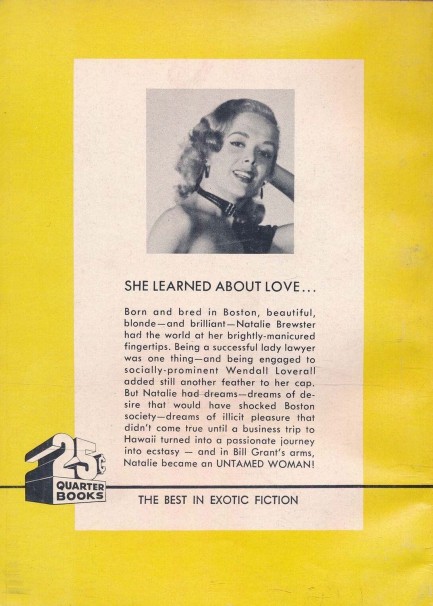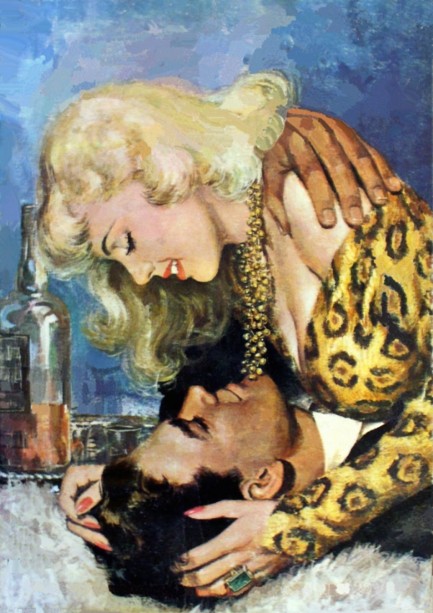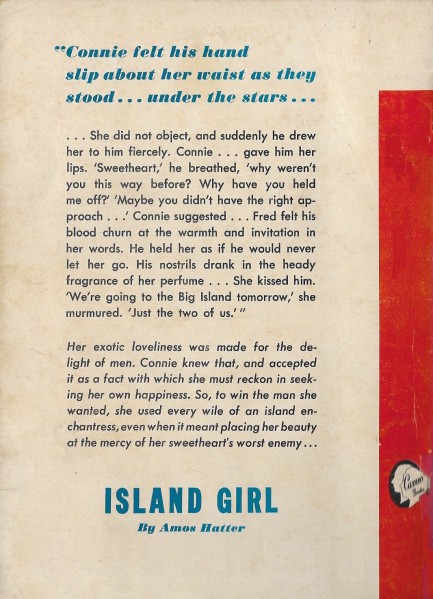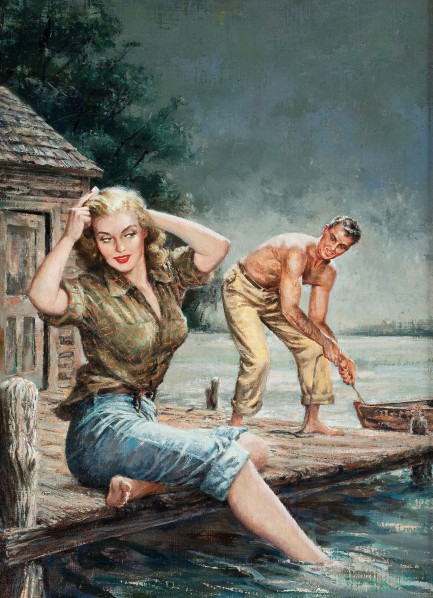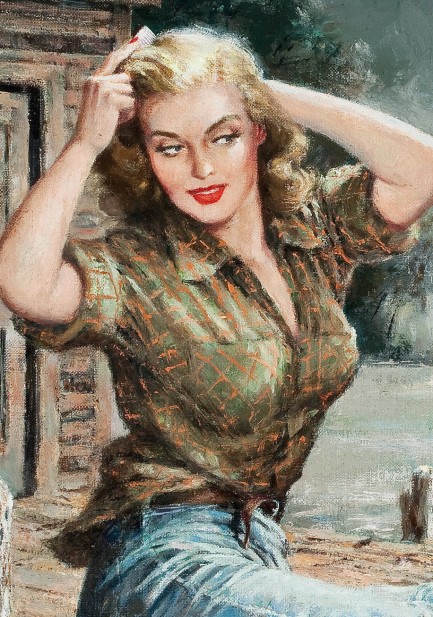 I'm begging you, baby. Plus, don't you realize virginity is an insult to mother nature? 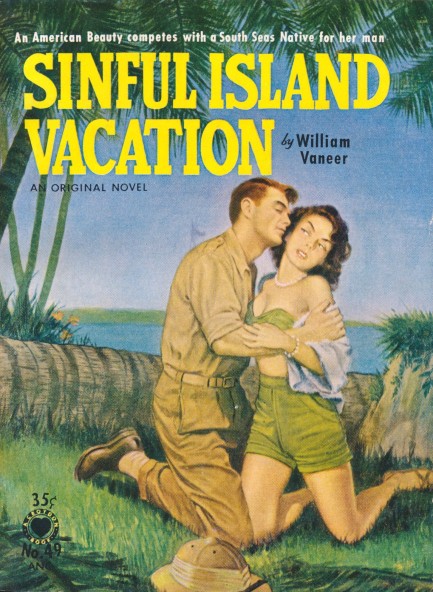
We didn't buy William Vaneer's, aka James W. Lampp's 1953 sleazer Sinful Island Vacation because some silly boy was trying to sell it for a hundred dollars, but we're always tempted by books with this premise because we've been on quite a few sinful island vacations. Our most sinful island: Roatán. And you thought we were going to say Santorini or Mallorca. Very sinful also. But we once got stuck on Roatán for a week when Honduras experienced one of its periodic convulsiónes. There's nothing like deadly political unrest to loosen people's inhibitions. We don't know on which island Vaneer's potboiler is set, but the rear cover refers to it as tropical, so it's a good bet it's in the Pacific somewhere. For our next sinful island vacation maybe we'll head out there.
 This is right about when every dog person I've ever known starts to rethink their preferences. 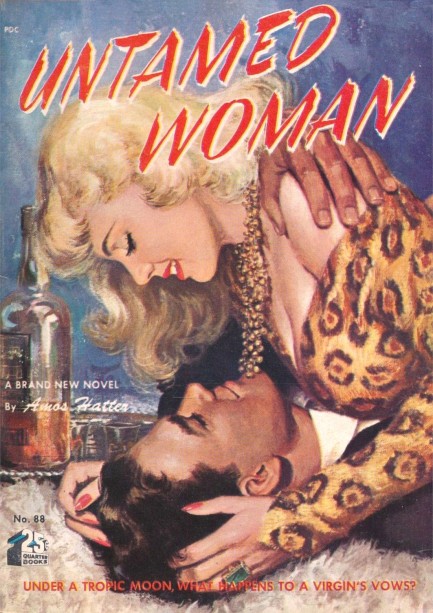
Amos Hatter entertained us very effectively with his 1952 Hawaiian romance Island Girl, and since we knew his 1951 novel Untamed Woman was set in the islands too, we grabbed it. Hatter, aka James W. Lampp, Ben West, et al, tells the story of laced up lawyer Natalie Brewster, who jets from Boston to paradise to get a contract signed by her firm's client Bill Grant. When her briefcase disappears at his bacchanalian luau she assumes he stole it to keep her from leaving so he can make advances toward her. After a time she isn't so sure he lifted it after all, but the missing briefcase does keep her there, and she gives in to Bill's overtures, and gets caught up in all of Hawaii's other distractions too.
Hatter is comfortable working within the setting, and punctuates his story with nice local color, as well as quirky humor. Our favorite sequence was a living room destroying fight between Natalie and her fierce rival Dorothy. Amazingly, of all the books we've read, that was the first knock-down drag-out—apart from the Modesty Blaise novels—that we've come across between two women. Hatter writes it well. The hatred is pure enough to set off Mauna Loa. The next day both Natalie and Dorothy are wrecked, which is what happens when you smash coffee tables and hurl vases at each other. The end of the book is a little rushed, and a little dumb, but if you want lightweight, male-oriented, 1950's sex adventure, Untamed Woman will get the job done. The cover on this, by the way, featuring a femme fatale in a leopard outfit, is uncredited.
 All's affair in love and show business. 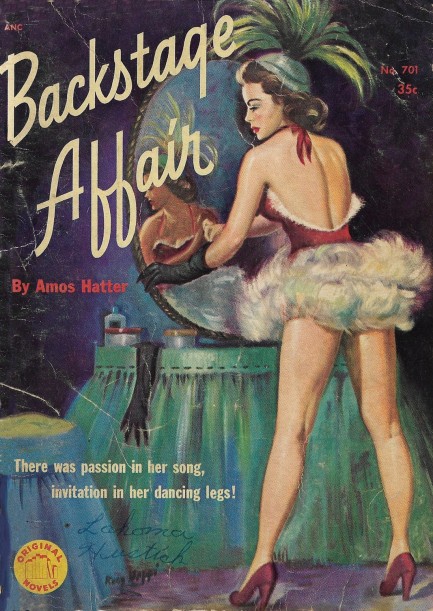
First matter—we met a couple of nice women at the gintoneria in one of our local plazas last night and said we'd mention them today as a way of proving that we were telling the truth about being the makers of this website. So hello, friends, and sorry about all the nudity you'll find here. Hah—well, not really. Anyway, last year we read Amos Hatter's (James W. Lampp's) unusual 1952 titillation novel Island Girl, and since we're repeat offenders when it comes to authors who intrigue us, we picked up another Hatter—1951's Backstage Affair. It's about a dancer and singer named Mitzi West who's trying earn her first big show business break, but is stuck in St. Louis finding it exceedingly difficult not to become a prostitute to support herself. By now you know the formula with these tales, so we don't need to explain the plot in more detail. It isn't as good as Island Girl, but it's enjoyable enough, and it came with Rudy Nappi cover art—signed by both him and a former owner of the book named Lahoma Hustich. Love your name, Lahoma.
 Well, I don't care who told you the pond is safe. I'm telling you it's toxic and you better climb out right now. 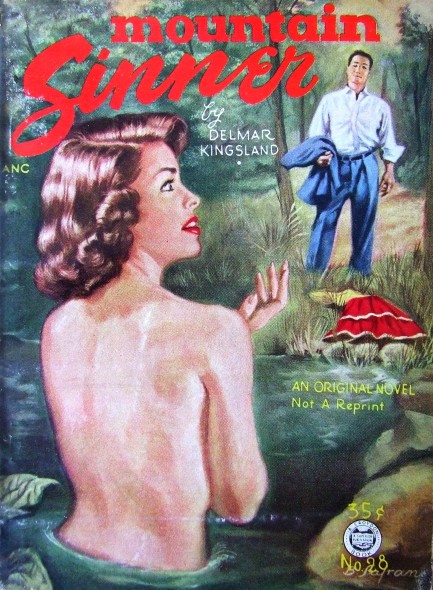
Above: a nice cover by Bernard Safran for the Croydon Books sleazer Mountain Sinner, written by Delmar Kingsland and published in 1953. We borrowed this from Sleazy Digest Books, a fun blogspot that has fueled some of our favorite purchases. Kingsland was actually James W. Lampp, who was also Amos Hatter, Ben West, Frederic Spencer, Homer Hatten, Anne Farrington, and William Vaneer, so add another pseudonym to his ledger—possibly his best. Even Lampp was a fake name. His real name, according to his 1994 obituary, was Lumpp. No wonder he hoarded pen names. We've featured him a lot, and the best way see those entries is to click here and scroll. Also, women surprised while skinny dipping is yet another common motif in mid-century paperback art. See more examples here, here, and here.
 Is this a subsidiary of the love cult I was in back in '53? If it is, then I've already had my whipping. 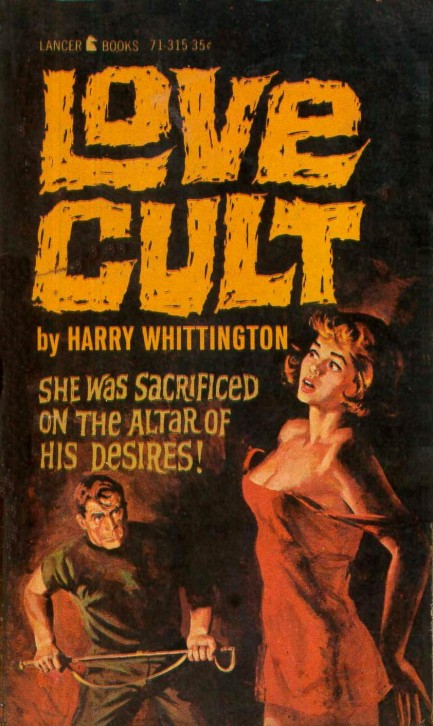
Above: a cover for Harry Whittington's Love Cult, published in 1962 by Lancer Books. This is an unusual case in mid-century fiction. The book is a reprint of the 1953 novel of the same name by William Vaneer, which was written under a pseudonym by James W. Lampp. Somehow the folks at Lancer got mixed up about that and attributed the book to Whittington. Embarrassing. We wonder if Lancer had to compensate Whittington in any way. You might assume the compensation would be to remove his name from this piece of low rent sleaze, but Whittington wrote plenty of books of this type this himself, so Love Cult definitely didn't hurt his reputation. Interested in what it's about? We tell you here.
 In Hatter's novel Hawaii is blue in more ways than one. 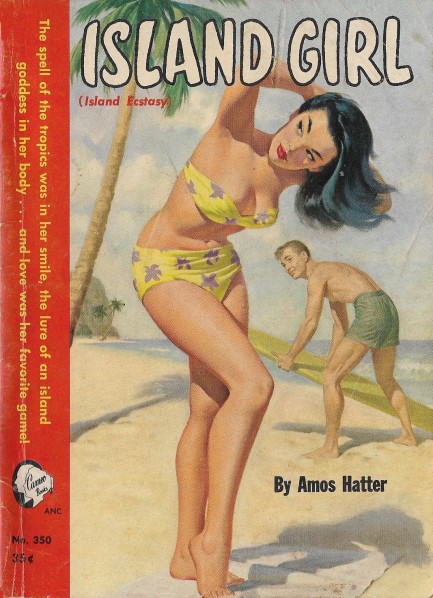
Amos Hatter, aka Ben West, aka James Lampp, originally published Island Girl as Island Ecstasy in 1952. Most copies of Island Girl are from a couple of years later, but somehow ours is also from 1952. The art, which is identical for both titles, is uncredited but very nice. The novel is about a Hawaiian beauty named Consuela Marlin, Connie for short, who takes a liking to a WASPish researcher named Jay Carter, and determines to win him over by any means necessary. Surprisingly for a 1952 novel, that leads to Connie bedding him—repeatedly.
Jay's a haole in Hawaiian lingo, a non-islander, which makes the romance a culture clash. It's also a clash of substance—Connie's relatable in every way, while Jay's goodhearted, but infuriatingly laissez-faire in his romantic attitudes. A complication soon arises in the form of a one percenter who lands on Oahu and decides he wants and is entitled to Connie. Forced kisses, stalkerish schemes, gaslighting, and browbeating are his tools, but this being a mid-century book, Hatter doesn't write him as a particularly bad guy, so much as a determined rival. What are the results of this shitty behavior? He gets what he wants—repeatedly.
These vintage sex dramas are strange as hell sometimes, but you know that going in, so you roll with it. Hatter's depiction of Consuela as independent yet submissive is dubious, but is in no way a surprise in a genre built around the supposed easy availability of women. We're just glad we didn't live during the era when men who were violent toward women were considered to be “a little forward” or “within their rights.” All that said, Island Girl is well written and worth a read, if for no other reason than the generational and sociological differences of the era it highlights.
 All you guys down here on the waterfront reek of fish. But that's okay. I used to live by the industrial pig farm, and the men there... pee yew! 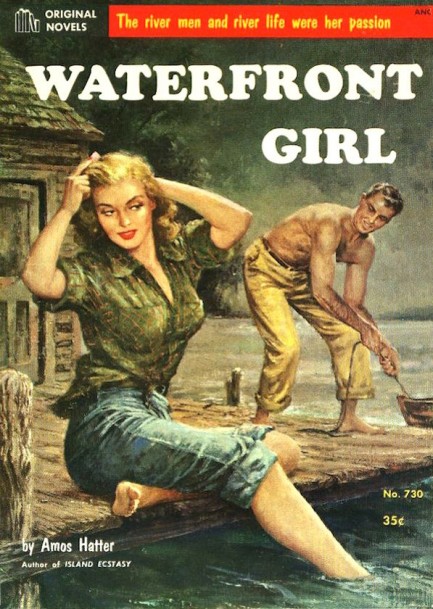
Didn't we just feature a cover for Waterfront Girl last month? Nope. That was Waterfront Blonde. Totally different book. Similar themes, though. We wouldn't go so far as to call books about untamable waterfront girls a sub-genre of mid-century fiction, but more than a few tales of that type hit newsstands during the 1950s. This one came from Amos Hatter, aka James W. Lampp, and tells the story of, well, an untamable waterfront girl on the mighty Mississippi. It's from Original Novels, was published in 1952, and the cover is unattributed. You see the original art below, with a close-up showing the detailed work. The artist really deserves recognition for this effort, but no such luck. Sign your art, everyone. Don't be like this person.
 Just ignore my daughter. She gets bitchy whenever she thinks I don't spend enough time with our son. 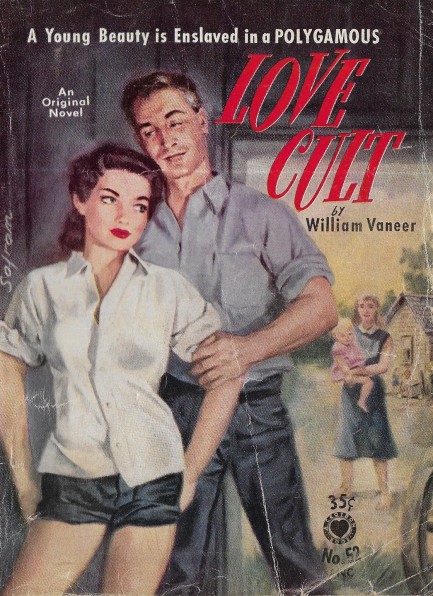
Bernard Safran is an artist we don't see nearly enough of, considering how much we like his work. He's responsible for the above cover of Love Cult, by William Vaneer for Croydon Books, 1953. The art tells all. A naive young woman rushes into marriage and finds herself trapped in a polygamous commune in the isolated Ozarks. In short order she loses her bodily autonomy, her virginity, and her dignity—but not her desire to escape. An unlikely alliance gives her a chance, but she still needs to outwit her husband somehow, and he's clever, mean, sneaky, and violent. Giving him the slip will take some work. We won't reveal more, except to mention that author William Vaneer is really James W. Lampp under a pseudonym.
Did we ever mention that there's a commune in our town? Actually, its residents live not in town, but on a hill a half mile to the east. They grow stuff up there and sell it in a local shop they own down in the main tourist area. They also run a restaurant. When you go in they try to interest you in their various communities in different countries, and are inordinately smiley and nice. Like in-your-personal-space nice. One time a waitress squeezed into a booth with us to take our lunch order, which was creepy enough that we never went back. But after reading Vaneer's potboiler maybe we'll visit again just to find out what they're smiling about. If you never hear from us again it's because we're having culty sex up on the hill.
 Then she smashed my head repeatedly into the turnbuckle until I lost consciousness. So... how was your day? 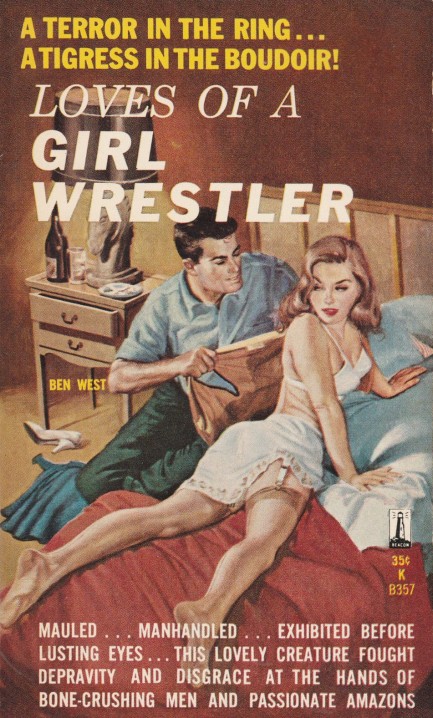
Nice cover for Ben West's Loves of a Girl Wrestler, from Beacon Books, with art by Al Rossi. We won't bother to summarize this one because we've also uploaded the interesting rear cover, just below, and it has a full rundown. Originally 1952 copyright, with this edition appearing in 1960.
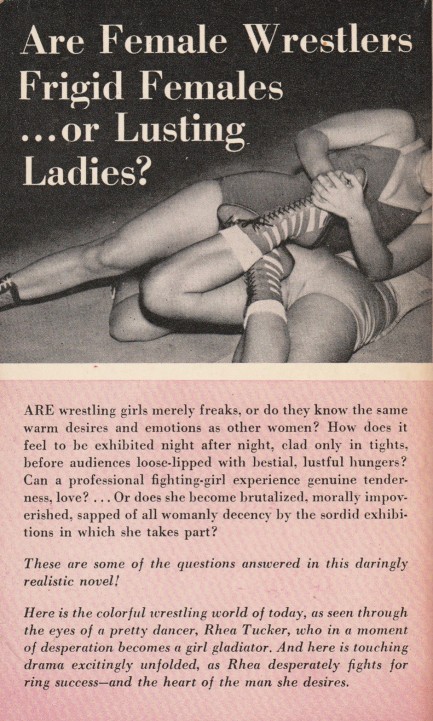
 I don't know much about football. I just know you're a tight end, and that's enough to pique my interest. 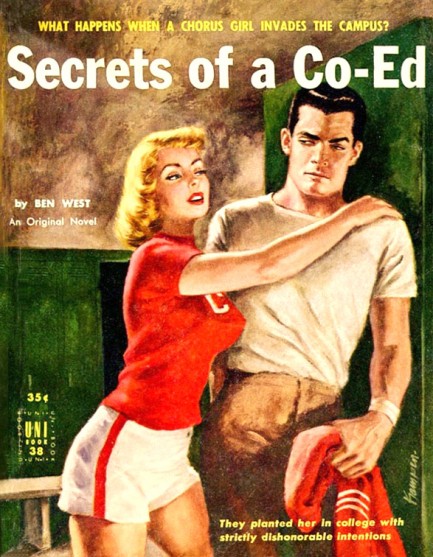
It's amazing how explicit sports commentary can be. In baseball you hear phrases like, “He shortened his stroke,” and, “He likes to go hard inside.” In basketball you'll hear, “He's always around the rim,” or variations thereof. But the winner has to be football, where you'll hear quite often, “His tight end was wide open.” Ben West's Confessions of a Co-Ed falls squarely into the sports sleaze niche of fiction, and the cover falls even more specifically into what we think of as locker room sleaze. We wouldn't go so far as to say it's an official genre, but we've noted many covers of this type.
Confessions was actually written by James W. Lampp using a pseudonym early in his writing career, and in this book he tells the story of a Broadway showgirl named Sally who enrolls in high school and pretty soon is distracting the football team so much they can't win games. As noted on the book front she's being paid by an organized crime ring. The idea is for the crooks to make a killing betting against the team, and of course the boys are pretty much powerless against Sally. But complications ensue when she finally comes across a player she actually likes—the studly quarterback. 1952, with cover art by Owen Kampen.
|
 |

The headlines that mattered yesteryear.
1939—Batman Debuts
In Detective Comics #27, DC Comics publishes its second major superhero, Batman, who becomes one of the most popular comic book characters of all time, and then a popular camp television series starring Adam West, and lastly a multi-million dollar movie franchise starring Michael Keaton, then George Clooney, and finally Christian Bale. 1953—Crick and Watson Publish DNA Results
British scientists James D Watson and Francis Crick publish an article detailing their discovery of the existence and structure of deoxyribonucleic acid, or DNA, in Nature magazine. Their findings answer one of the oldest and most fundamental questions of biology, that of how living things reproduce themselves. 1967—First Space Program Casualty Occurs
Soviet cosmonaut Vladimir Komarov dies in Soyuz 1 when, during re-entry into Earth's atmosphere after more than ten successful orbits, the capsule's main parachute fails to deploy properly, and the backup chute becomes entangled in the first. The capsule's descent is slowed, but it still hits the ground at about 90 mph, at which point it bursts into flames. Komarov is the first human to die during a space mission. 1986—Otto Preminger Dies
Austro–Hungarian film director Otto Preminger, who directed such eternal classics as Laura, Anatomy of a Murder, Carmen Jones, The Man with the Golden Arm, and Stalag 17, and for his efforts earned a star on Hollywood's Walk of Fame, dies in New York City, aged 80, from cancer and Alzheimer's disease. 1998—James Earl Ray Dies
The convicted assassin of American civil rights leader Martin Luther King, Jr., petty criminal James Earl Ray, dies in prison of hepatitis aged 70, protesting his innocence as he had for decades. Members of the King family who supported Ray's fight to clear his name believed the U.S. Government had been involved in Dr. King's killing, but with Ray's death such questions became moot.
|

|
|

It's easy. We have an uploader that makes it a snap. Use it to submit your art, text, header, and subhead. Your post can be funny, serious, or anything in between, as long as it's vintage pulp. You'll get a byline and experience the fleeting pride of free authorship. We'll edit your post for typos, but the rest is up to you. Click here to give us your best shot.

|
|




